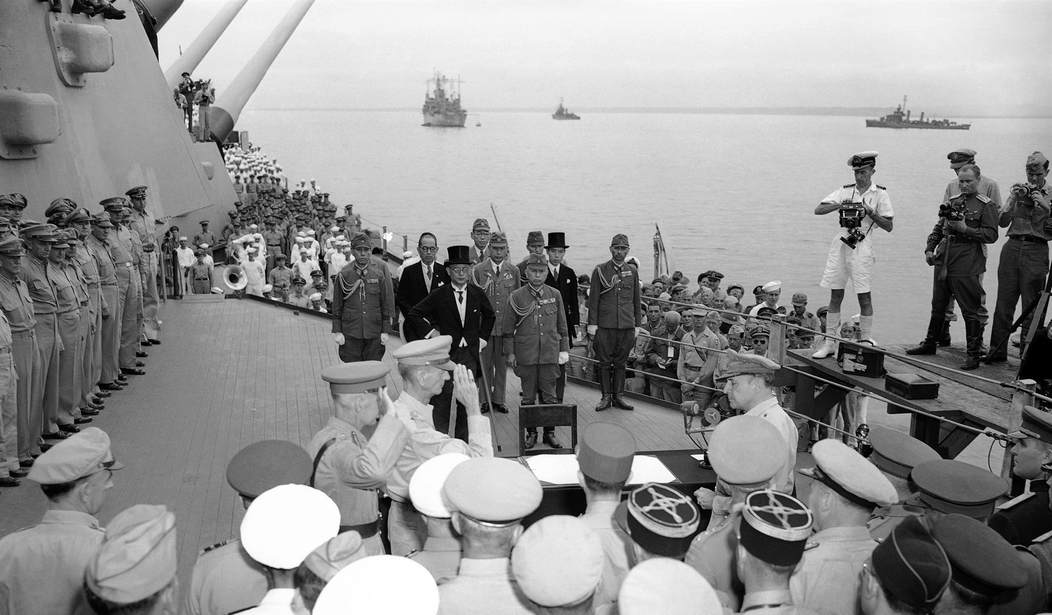Seventy-nine years ago today, representatives of imperial Japan signed official surrender documents, ending WWII. It was a day both for rejoicing and mourning. Rejoicing, because the war was over and more than a million Americans wouldn’t be in deadly jeopardy during an invasion of Japan; mourning for the countless soldiers and civilians butchered by Japanese forces during the war.
“Today the guns are silent. A great tragedy has ended. A great victory has been won,” said Gen. Douglas MacArthur, who had had to escape a Japanese onslaught in 1942 and in 1945 presided over Japan’s surrender. “The skies no longer rain death, the seas bear only commerce, men everywhere walk upright in the sunlight. The entire world lies quietly at peace. The holy mission has been completed. We have had our last chance. If we do not devise some greater and more equitable system, Armageddon will be at our door.”
The war could have gone on for years beyond 1945 if Americans had had to invade Japan. Many moderns have no idea how many lives were saved on both sides by dropping the atomic bombs on Hiroshima and Nagasaki. As horrible as the after effects of the atomic bombs were, the Allies -- the Americans especially -- knew from their own experience that the Japanese actually did fight to the last man, that they preferred suicide to surrender. Their women would kill their children rather than surrender — the Americans had witnessed it. Meanwhile, estimates of imperial Japan’s genocidal massacres of Koreans, Chinese, Filipinos, Indochinese and more (including POWs) left between 3 million and 10 million dead. How could the U.S. make such slaughter end?
Related: Bing Crosby in WWII: A Star’s Heartfelt Letters to Soldiers and Families
“Personnel at the Navy Department estimated that the total losses to America would be between 1.7 and 4 million with 400,000 to 800,000 deaths. The same department estimated that there would be up to 10 million Japanese casualties.”
The atomic bombs obviously prevented all those American casualties, and cost up to around 200,000 Japanese lives. We are still using the Purple Heart awards manufactured for World War II thanks to the decision not to invade Japan, but to drop the bombs. Young American men like my own grandfather lived to have children and grandchildren. While the Japanese war council and military commanders were still reluctant or unwilling to surrender, Emperor Hirohito intervened. Imperial Japan would do the unthinkable, it would “bear the unbearable,” as Hirohito said: it would surrender.
From New York City’s Times Square to the streets of San Francisco, in cities and little towns from coast to coast, Americans celebrated at the end of August and going into September. Hawaiians were especially triumphant, with the tragedy of Japan’s attack on Pearl Harbor still fresh in their minds. The war was over!
On the USS Missouri in Tokyo Bay, on a ship which had been in battle at Iwo Jima and Okinawa, 11 Japanese delegates were met by U.S. Gen. Douglas MacArthur, Adm. Chester Nimitz, and Adm. William F. “Bull” Halsey, Jr., according to the National WW2 Museum. Also present were British Gen. Arthur E. Percival and US Gen. Jonathan M. Wainwright (both of whom had had the previous humiliating experiences of surrendering to Japanese forces), thousands of American sailors, and representatives of all the Allied nations, including Great Britain, China, the Soviet Union, France, and Australia.
Japanese diplomat Toshikazu Kase remembered, “A million eyes seemed to beat on us with the million shafts of a rattling storm of arrows barbed with fire. Never have I realized that the glance of glaring eyes could hurt so much. We waited ... standing in the public gaze like penitent boys awaiting the dreaded schoolmaster.” The bloodshed had stopped, but the wounds throb even up to our own day.
V-J Day in Times Square: As pedestrians watch, an American sailor passionately kisses a white-uniformed nurse in Times Square to celebrate the long awaited-victory over Japan on August 14, 1945.#History #WWII pic.twitter.com/o2puHPOKr4
— World War II History (@WW2Facts) August 14, 2024
But, at that moment at least, a “great tragedy [had] ended” and a “great victory [had] been won.” The guns fired no more, no longer would death rain down from the heavens. Brave Americans and Allies had not fought and died in vain — the war was over and the world was at peace.










Join the conversation as a VIP Member